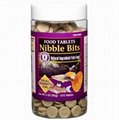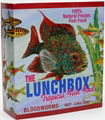| Model: | Bagged |
|---|---|
| Brand: | San Francisco Bay Brand |
| Origin: | Made In China |
| Category: | Agriculture & Foods / Agricultural Products & Resources / Aquatic Products |
| Label: | Mysis shrimp , Mysids , fish food |
| Price: |
-
|
| Min. Order: | - |
| Last Online:01 Nov, 2023 |
The Mysis Shrimp (also known as Opossum shrimp) we process –Neomysis japonica– actually are not shrimp but crustaceans resembling shrimp. Female mysids have a brood pouch in which they carry their larvae. In contrast, ‘true’ shrimp have no brood pouch and have free-swimming larvae. Neomysis japonica naturally occur in brackish water estuaries and lagoons and spend most of their time living on the estuary or lagoon floor or just above the floor. The omnivorous mysids mainly feed by predating on meso-zooplanktonic animals (microscopic, planktonic animals having a size between 0.2 and 2 mm, e.g. copepods, rotifers, etc.), estuarine flocs (suspended sediment particles & detritus) and microalgae. As is the case with brine shrimp, the food source the mysids were feeding on will determine the color shine they have when being harvested.
Our mysids are harvested daily just before dawn during late winter and early spring. Mysids harvested from different places in an estuary might show a different color even though they were harvested on the same day. The harvested mysids are transported to our facility where they undergo a succession of processing steps before being bagged, quick-frozen, cased out and stored in our cold storage. Only hours pass between the time the mysids are harvested and the time they are frozen.
We offer frozen, bagged Mysis Shrimp in resealable (zip-lock) LDPE bags in the following sizes:
All bags are manually filled to safeguard product integrity and are frozen individually in our quick-freezer. Each bag contains a lot code and date of expiry for tracking purposes. Samples of each lot are submitted to an accredited laboratory for Salmonella analyses before being sold.
| SKU: | 88399 & 88499 |
|---|---|
| Feed to:: | Small freshwater or marine fish, seahorses. |











